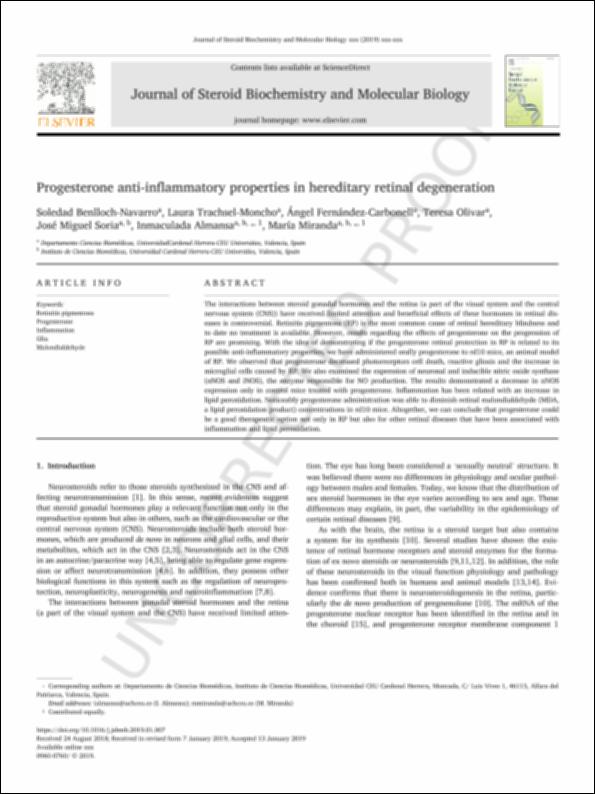Por favor, use este identificador para citar o enlazar este ítem:
http://hdl.handle.net/10637/11755Progesterone anti-inflammatory properties in hereditary retinal degeneration
| Título : | Progesterone anti-inflammatory properties in hereditary retinal degeneration |
| Autor : | Benlloch Navarro, María Soledad Trachsel Moncho, Laura Fernández Carbonell, Ángel Olivar Rivas, Teresa Soria López, José Miguel Almansa Frías, María Inmaculada Miranda Sanz, María |
| Materias: | Eye - Diseases - Treatment.; Progesterona - Uso terapéutico.; Progesterone - Therapeutic use.; Retinitis pigmentaria - Tratamiento.; Oftalmia - Tratamiento.; Conjunctiva - Diseases - Treatment.; Retinitis pigmentosa - Treatment.; Ojos - Enfermedades - Tratamiento. |
| Editorial : | Elsevier. |
| Citación : | Benlloch-Navarro, S., Trachsel-Moncho, L., Fernández-Carbonell, Á., Olivar, T., Soria, JM., Almansa, I. et al. (2019). Progesterone anti-inflammatory properties in hereditary retinal degeneration. Journal of Steroid Biochemistry and Molecular Biology, vol. 189 (may), pp. 291-301. DOI: https://doi.org/10.1016/j.jsbmb.2019.01.007 |
| Resumen : | The interactions between steroid gonadal hormones and the retina (a part of the visual system and the central nervous system (CNS)) have received limited attention and beneficial effects of these hormones in retinal diseases is controversial. Retinitis pigmentosa (RP) is the most common cause of retinal hereditary blindness and to date no treatment is available. However, results regarding the effects of progesterone on the progression of RP are promising. With the idea of demonstrating if the progesterone retinal protection in RP is related to its possible anti-inflammatory properties, we have administered orally progesterone to rd10 mice, an animal model of RP. We observed that progesterone decreased photoreceptors cell death, reactive gliosis and the increase in microglial cells caused by RP. We also examined the expression of neuronal and inducible nitric oxide synthase (nNOS and iNOS), the enzyme responsible for NO production. The results demonstrated a decrease in nNOS expression only in control mice treated with progesterone. Inflammation has been related with an increase in lipid peroxidation. Noticeably progesterone administration was able to diminish retinal malondialdehyde (MDA, a lipid peroxidation product) concentrations in rd10 mice. Altogether, we can conclude that progesterone could be a good therapeutic option not only in RP but also for other retinal diseases that have been associated with inflammation and lipid peroxidation. |
| Descripción : | Este artículo se encuentra disponible en la página web de la revista en la siguiente URL: https://www.sciencedirect.com/science/article/abs/pii/S0960076018305077?via%3Dihub This is the pre-peer reviewed version of the following article: Benlloch-Navarro, S., Trachsel-Moncho, L., Fernández-Carbonell, Á., Olivar, T., Soria, J.M., Almansa, I. et al. (2019). Progesterone anti-inflammatory properties in hereditary retinal degeneration. Journal of Steroid Biochemistry and Molecular Biology, vol. 189 (may), pp. 291-301, which has been published in final form at https://doi.org/10.1016/j.jsbmb.2019.01.007. Este es el pre-print del siguiente artículo: Benlloch-Navarro, S., Trachsel-Moncho, L., Fernández-Carbonell, Á., Olivar, T., Soria, J.M., Almansa, I. et al. (2019). Progesterone anti-inflammatory properties in hereditary retinal degeneration. Journal of Steroid Biochemistry and Molecular Biology, vol. 189 (may), pp. 291-301, que se ha publicado de forma definitiva en https://doi.org/10.1016/j.jsbmb.2019.01.007. |
| URI : | http://hdl.handle.net/10637/11755 |
| Derechos: | http://creativecommons.org/licenses/by-nc-nd/4.0/deed.es |
| ISSN : | 0960-0760 |
| Fecha de publicación : | 12-may-2019 |
| Centro : | Universidad Cardenal Herrera-CEU |
| Aparece en las colecciones: | Dpto. Ciencias Biomédicas |
Los ítems de DSpace están protegidos por copyright, con todos los derechos reservados, a menos que se indique lo contrario.


